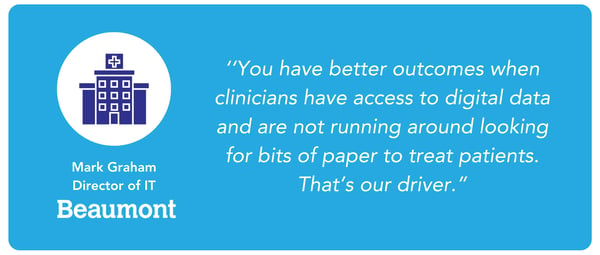Recent cyber events within the Healthcare space, have accelerated the race from on-premise to cloud from a security perspective. In essence, all NHS organizations have, or plan to adopt an ‘internet first’ approach to their systems, whereby a cloud-hosted solution (predominately Microsoft) is the preferred option for several reasons. There is no traditional server infrastructure to maintain or upkeep, costs are lower as you run what you need and can scale quickly as required, and crucially you then have the ability to redeploy those finite key personnel who maintained the previous on-premise environments to focus on more value-adding tasks like strategic initiatives, digital innovation, and process optimization and automation.
As an organization, you may have already transitioned to the cloud, or be in the middle of this project, and now you are ready to leverage that position further and include your Digital Transformation initiatives around automating processes/workflow that is currently paper-based or controlled by spreadsheets and email with restricted control or reporting functionality to enable fast decision making. Health Education England recently released the NHS Providers Guide, for trust leaders, to enable successful digital delivery. The document uncovers practical take-aways, highlighting key considerations that board members should be aware of when building and deploying digital services.
Health Education England recently released the NHS Providers Guide, for trust leaders, to enable successful digital delivery. The document uncovers practical take-aways, highlighting key considerations that board members should be aware of when building and deploying digital services.
Let’s look at each point around process automation and workflow management in healthcare in the context of a 100% no code tool.
- Deliver things that patients and staff need
- Set clear, realistic goals
- Test, measure, and learn how it’s working
- Think long term, deliver short term
- Invest in a dedicated, cross-functional in-house digital team
- Get the best out of technology suppliers
- Build trust, not barriers
- Not stick to the wrong plan.
Deliver Things That Patients and Staff Need
Transformation projects should be supported, rather than led, by IT. If you want to see widespread adoption across multiple departments then involving your core users is key in those early stages. Input and starting points around healthcare process automation should be led by patient-facing and back-office personnel, who can identify common process challenges that they face day-to-day which makes their roles inefficient.
A quick win is to start addressing the NHS processes that are time-intensive and taking key personnel away from important patient-facing time. By reducing the time spent on repetitive administrative tasks, health workers are enabled to focus on better patient outcomes -the ultimate goal of any organization in the healthcare space.
Set Clear, Realistic Goals
Identify specific, measurable, achievable, realistic, and timebound deliverables around the project team; training staff; prioritizing processes for automating; your go-live date; and ensure the entire digital transformation team is aligned.
Test, Measure, and Learn How It’s Working
Allowing NHS users to evaluate a solution is critical. Encourage process owners to build out their process or workflow in a test environment, and seek end-user feedback from stakeholders such as clinicians, or ward staff, around what works and what requires some fine-tuning quickly. Doing this in a controlled environment, before pushing into production, is paramount.
The need to be agile and make changes to an existing process 3 or 6 months down the line easily is also key, even if that change is being made by someone who did not initially design or build that workflow as processes inevitably change and the ability to seamlessly tweak existing processes is crucial.
Think Long Term, Deliver Short Term
Quick wins are vital in any digital transformation project, for several reasons. Firstly, you will be taking some people outside of their comfort zone. The ability to deliver a quick win in the first two to six weeks is vital in building the confidence and increasing stakeholder engagement required for long-term success and buy-in. Identifying specific processes/workflows that are known to be laborious and full of inefficiencies and switching these to fully automated accurate workflows eliminating the manual steps and reducing the length of manual processing time by at least 50% is immensely powerful and encourages teams to consider additional use cases and departments who can benefit from not only the initial pilot automated processes but others that are perhaps specific to particular areas of the NHS.
 Delivering short-term is important but having a digital process automation solution in place that can scale is also imperative. The ability to empower process owners, who know the process but cannot write code, is incredibly important to organizations where there is a shortage of IT talent - a global phenomenon that is unlikely to change in the near future.
Delivering short-term is important but having a digital process automation solution in place that can scale is also imperative. The ability to empower process owners, who know the process but cannot write code, is incredibly important to organizations where there is a shortage of IT talent - a global phenomenon that is unlikely to change in the near future.
A 100% no code tool, which eliminates IT reliance and the potential for projects to be stifled by a lack of coding skillset, or expensive external providers, means that you will be able to keep pace with the ever-increasing demands for workflow automation.
Invest in a Dedicated, Cross-Functional In-house Digital Team
A common misconception is that it will take a huge team and an amount of time to deliver on digitalization projects. In an ideal world, organizations need a software solution that is not an onerous task in terms of implementation and training and compliments your current infrastructure and skillset within the organization.
Yes, there will be some complexity to enterprise software but with a solution that has no code you will have process owners within the organization who will already have the skillset, and ability, to build out workflows at speed and accelerate your digital journey.
Get the Best Out of Technology Suppliers
In the first instance uncover what you can tap into in your existing technology. If you are a Microsoft house, then leverage this position to include process automation. FlowForma Process Automation, as an example, requires no additional hardware or infrastructure and is installed inside your SharePoint environment ensuring all data/documents reside entirely within your environment. From a compliance and GDPR perspective, this is paramount.
Make sure your technology supplier can provide you with templates that are in production in other hospitals/NHS Trusts, as these can be used out of the box, or with minimal tweaking to expedite that ROI and enjoy successful outcomes fast.
Technology is always evolving; ensure you have agreed on SLAs and request regular updates that are scheduled on the vendors’ product roadmap. Evaluate how these new features might be used by the NHS in future projects.
Build Trust Not Barriers
It is especially important that users of the software, are included and consulted in the early phase of implementation. IT and Digital teams should be seen as the facilitators of the project as opposed to driving the project narrative.
If end users are not part of this process, you will invariably find that projects stagnate, or meet ‘blockers’ and stakeholders, who potentially may feel that something has been forced on them, resist.
If you can deliver quick wins, by identifying an area where success is more likely, then this shared ‘good news’ story’ will filter through to others, and that success can spur other departments to follow suit in fear of being left behind. In order to do this, it is critical to look at solutions that are proven in your space and have referenceable proof points around delivering fast go-live projects.
Do Not Stick to the Wrong Plan
Due diligence at the beginning, and a comprehensive evaluation of the software required, should offset the risk associated with implementing a solution that is a wrong fit. Ensure you have the correct project team identified at the start of the project and a champion who has ideally been involved in all aspects of the project, at the preliminary stages, to be part of the implementation team.
However, if a project is not meeting the early key deliverables/milestones agreed upon at the outset stop and reassess with all parties in order to try and get things back on track and deliver a successful project.
What Next?
Process Automation in Healthcare is the necessary step forward in the move toward improved compliance and communication and delivering enhanced patient care. Digital Transformation teams across the NHS are tasked with implementing streamlined online processes that elevate the healthcare provided in all Trusts.
The Process Automation Healthcare use cases are endless. Trusts across the UK are automating simple and complex processes such as hospital admissions and releases, hospital transfer referrals, theatre notes, clinician processes and medication incident reports to name a few.
Review the various FlowForma Healthcare success stories and get a better understanding of how the Healthcare Process Accelerator templates can help you to adapt and deploy process automation at speed. Alternatively, book a personalised demo with one of our Healthcare process experts today to get started.
.png) By
By 
.gif?width=700&name=ST%20PATRICKS%20DAY%20(1).gif)





